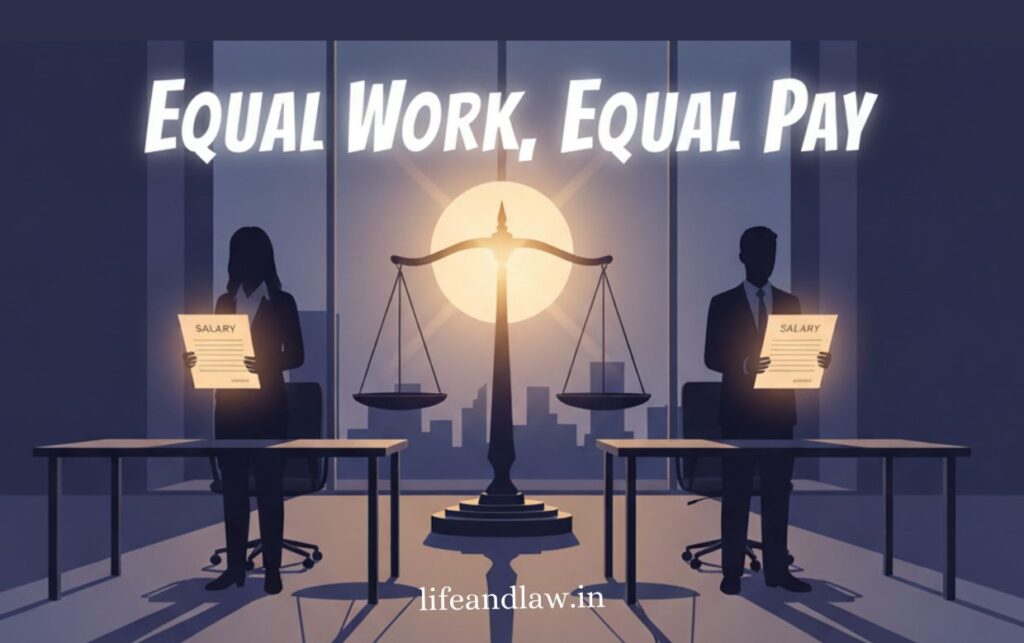Trending

Every year, International Equal Pay Day on September 18th serves as a global reminder of one of the most persistent workplace injustices: the gender pay gap. Despite rising awareness and legislative measures, women around the world still earn approximately 77 cents for every dollar earned by men, according to latest UN data. In India, the issue is no less pressing, particularly in the informal sector, where salary discrepancies are widespread and generally unrecorded.
In 2025, when India modernises its labour market, the question remains: Does Indian law adequately safeguard workers from wage discrimination? This article delves at the country’s legal framework, its application in many industries, and the ongoing hurdles of making “equal pay for equal work” a reality for all.
India has always recognised the value of salary equality. The Equal Remuneration Act of 1976 was one of the first laws enacted to address salary discrimination based on gender. Its central clause required equal compensation for men and women doing the same or equivalent work and outlawed gender discrimination in recruiting.
However, this Act was abolished and incorporated into the Code on Wages, 2019. The Code merged four prior labour laws, notably the Equal Remuneration Act, and sought to simplify and standardise wage-related requirements across industries.
Employers are banned by Section 3 of the Code on Wages from discriminating based on gender in areas of salaries and recruiting for the same or similar work. The law applies to both organised and unorganised sectors, affecting all employees regardless of industry, designation, or wage bracket.
As of 2025, no significant changes have been made to the Code in this context, although ongoing discussions over pay transparency and gig economy regulations indicate that additional adjustments may be on the way.
Despite legal protections, gender pay disparities remain in India. Oxfam India’s 2024 India Discrimination Report finds that women in urban areas earn much less than men in self-employment, regular, and informal jobs. While a 27% wage difference is frequently quoted, it is based on a 2016 report, which revealed significant but variable wage inequalities.
One major reason is that rules, such as the Code on Wages, frequently remain on paper, with enforcement mechanisms that are weak or inconsistent. In the informal sector, which employs approximately more than 90% of India’s workforce, workers are frequently unaware of their rights, and wage negotiations are informal or undocumented.
Another issue is wage secrecy in private businesses. Employees rarely have access to comparative wage data, making it difficult to identify or challenge discriminatory practices. Even when inconsistencies are identified, the lack of readily available grievance redressal channels frequently inhibits action.
Formal Sector
Compliance with equal pay rules is higher in India’s organised industries, such as information technology, banking, and manufacturing, particularly in multinational businesses subject to worldwide scrutiny. Even here, inequities exist due to gendered roles, which frequently place women in lower-paying occupations.
Informal Sector
The law faces the greatest challenges in the informal economy, which includes domestic work, construction, street vending, and other activities. Women frequently earn significantly less than men in this setting, even while performing equal jobs. Their lack of formal contracts and bargaining power exposes them to exploitation.
Agricultural Sector
Women have a significant role in India’s rural economy, particularly in agriculture. Nonetheless, women farm workers are paid approximately 22-25% less than men, although contributing equally. Traditional gender norms and social structures exacerbate the situation.
Gig and Platform Economy
With the advent of app-based work, including delivery services and beauty platforms, new issues have surfaced. Many of these platforms lack transparent wage systems, and female gig workers frequently earn less due to shorter hours, safety issues, and algorithmic biases in work allocation. The legal framework is constantly being developed to address this fast increasing sector.
Over time, Indian courts have played an important role in enforcing the idea of equal pay. In the historic decision of Mackinnon Mackenzie & Co. Ltd. v. Audrey D’Costa, the Supreme Court ruled in favour of equal pay for female stenographers doing the same work as males.
Recent decisions have elaborated on this, emphasising that “same work” does not imply identical work, but rather work of similar type, skill, and responsibility. Courts have also highlighted that employers cannot use market variables to justify salary inequalities between genders.
Government organisations such as the National Commission for Women and state labour agencies have also conducted periodic awareness campaigns. However, there is still a long way to go towards guaranteeing effective implementation.
To truly close the pay gap, India must go beyond legal compliance and cultivate a culture of justice and responsibility. Some major steps forward are:
Stronger Enforcement: Labour inspectors want additional training and resources to monitor pay practices, particularly in small businesses and the informal sector.
Pay Transparency: Encourage employers to provide wage bands to assist identify inequalities.
Gender Audits: Mandatory wage audits for medium and large organisations may reveal systemic flaws.
Worker Education: Grassroots activities to educate women about their pay rights are crucial.
The intersectional approach: Addressing income disparities not only by gender, but also by caste, handicap, and geography.
Equal pay for equal work is more than just a legal necessity; it is a basic human right. While India has made progress, meaningful transformation would require more enforcement, awareness, and cultural reforms to close the gender wage gap.
Adv. Abdul Mulla is driving this shift through platforms such as www.asmlegalservices and www.lifeandlaw.in, which promote legal awareness and workplace equality. After all, economic justice supports social justice.
Adv. Abdul Mulla (Mob. No. 937 007 2022) is a seasoned legal professional with over 18 years of experience in advocacy, specializing in diverse areas of law, including Real Estate and Property Law, Matrimonial and Divorce Matters, Litigation and Dispute Resolution, and Will and Succession Planning. read more….
Copyright BlazeThemes. 2025